Report on Cross-Cultural Management: Ireland and South Korea
VerifiedAdded on 2022/08/23
|7
|1198
|24
Report
AI Summary
This report provides a comparative analysis of the cultural differences between Ireland and South Korea, focusing on communication styles and cultural dimensions. It utilizes HALL theory to highlight the high-context nature of both cultures, while also exploring the nuances in their communication approaches. The report further examines cultural dimensions through the lens of Trompenaars' and Hofstede's models, contrasting the two countries across various factors such as universalism vs. particularism, individualism vs. communitarianism, power distance, masculinity vs. femininity, and long-term orientation. The analysis provides insights into how these cultural differences impact business practices and communication strategies, offering a comprehensive overview for understanding cross-cultural management.
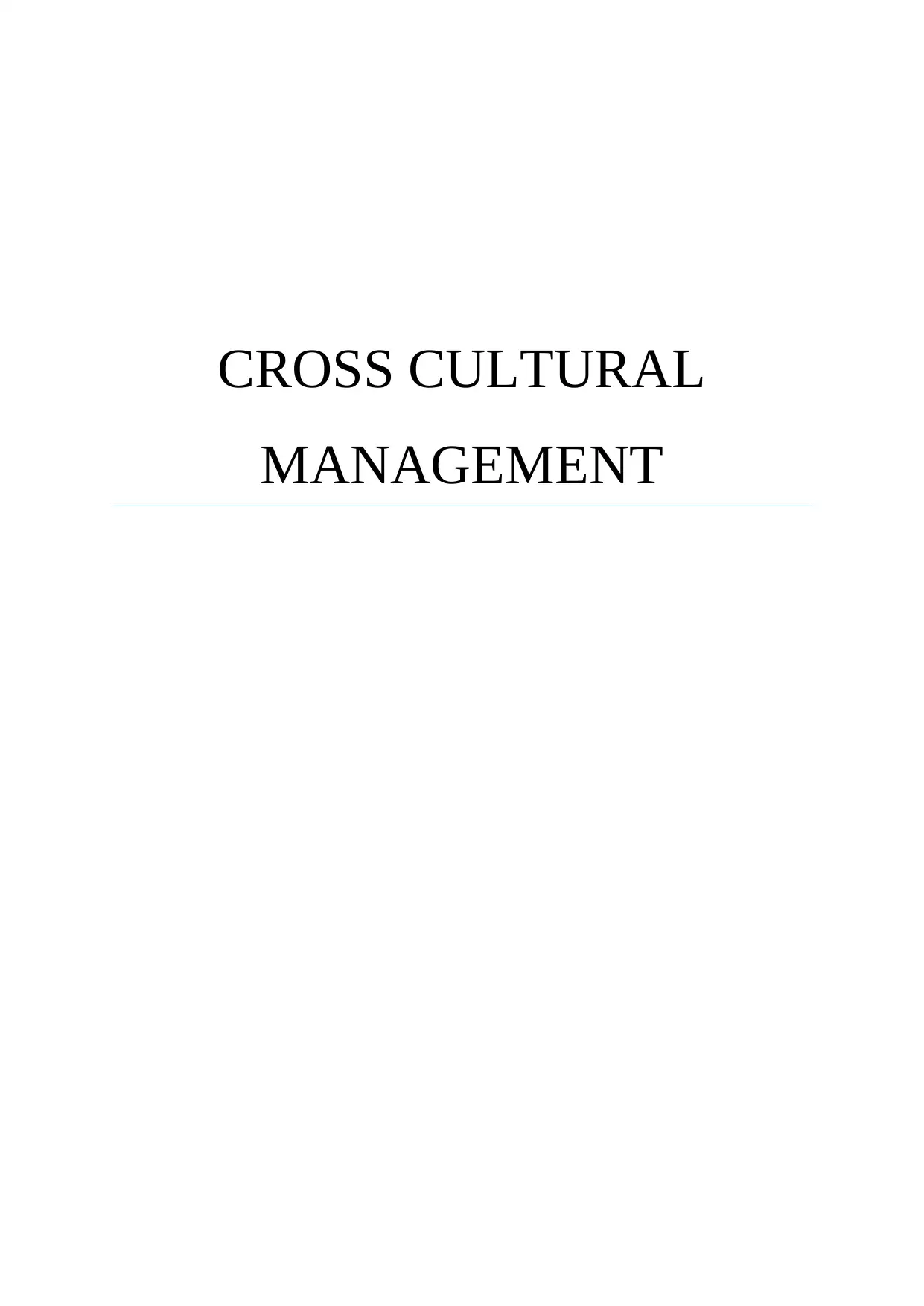
CROSS CULTURAL
MANAGEMENT
MANAGEMENT
Paraphrase This Document
Need a fresh take? Get an instant paraphrase of this document with our AI Paraphraser
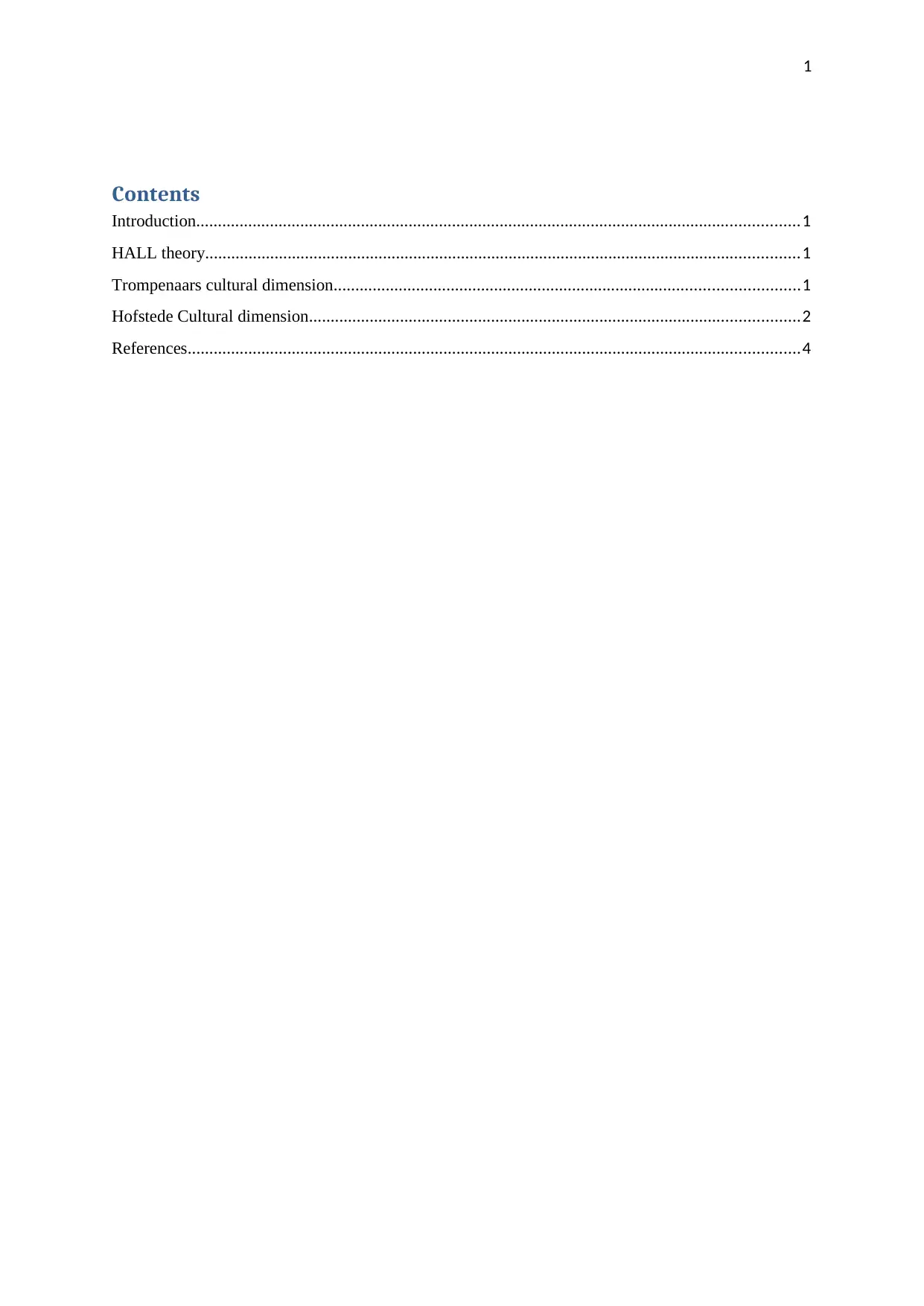
1
Contents
Introduction...........................................................................................................................................1
HALL theory.........................................................................................................................................1
Trompenaars cultural dimension...........................................................................................................1
Hofstede Cultural dimension.................................................................................................................2
References.............................................................................................................................................4
Contents
Introduction...........................................................................................................................................1
HALL theory.........................................................................................................................................1
Trompenaars cultural dimension...........................................................................................................1
Hofstede Cultural dimension.................................................................................................................2
References.............................................................................................................................................4
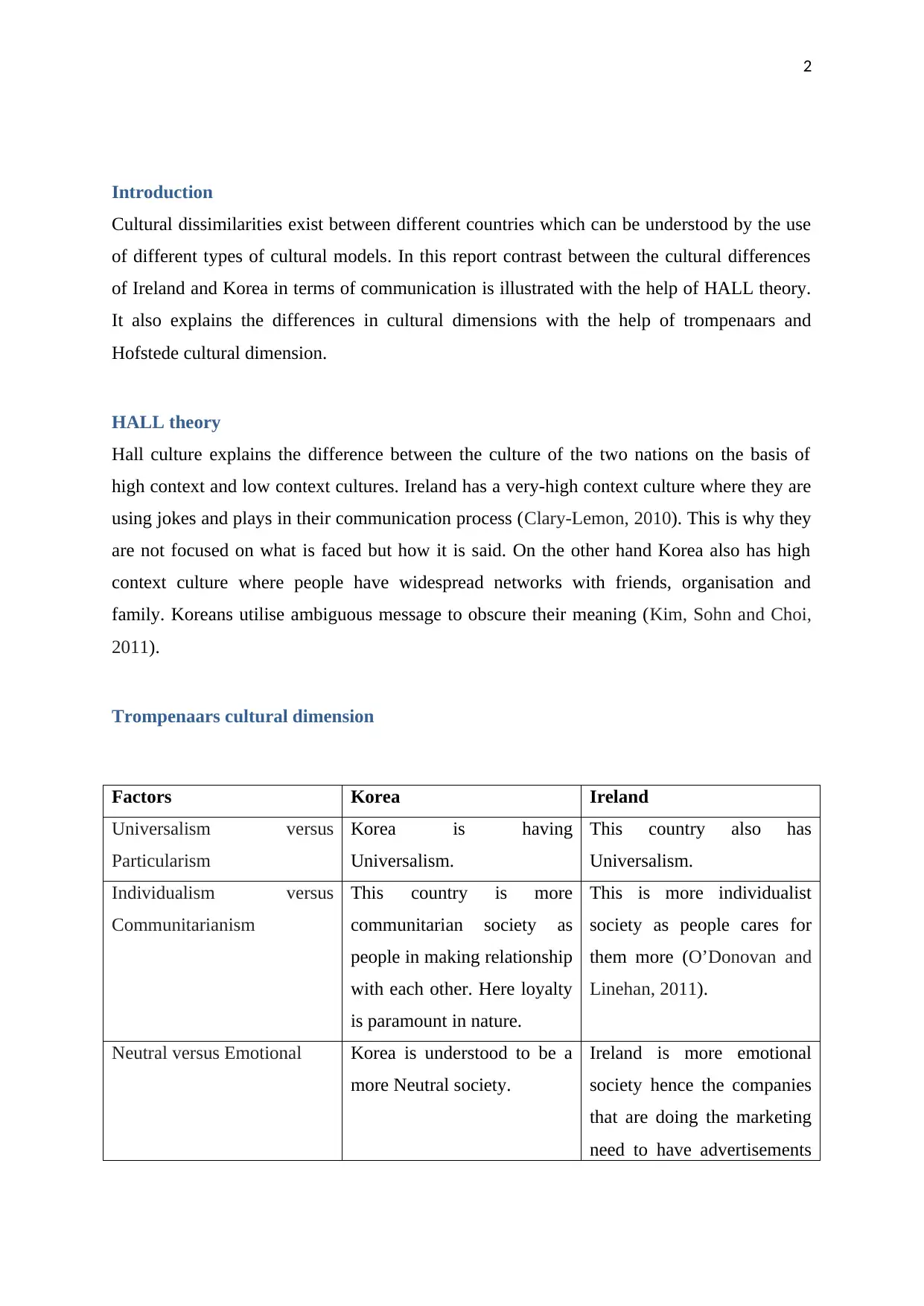
2
Introduction
Cultural dissimilarities exist between different countries which can be understood by the use
of different types of cultural models. In this report contrast between the cultural differences
of Ireland and Korea in terms of communication is illustrated with the help of HALL theory.
It also explains the differences in cultural dimensions with the help of trompenaars and
Hofstede cultural dimension.
HALL theory
Hall culture explains the difference between the culture of the two nations on the basis of
high context and low context cultures. Ireland has a very-high context culture where they are
using jokes and plays in their communication process (Clary-Lemon, 2010). This is why they
are not focused on what is faced but how it is said. On the other hand Korea also has high
context culture where people have widespread networks with friends, organisation and
family. Koreans utilise ambiguous message to obscure their meaning (Kim, Sohn and Choi,
2011).
Trompenaars cultural dimension
Factors Korea Ireland
Universalism versus
Particularism
Korea is having
Universalism.
This country also has
Universalism.
Individualism versus
Communitarianism
This country is more
communitarian society as
people in making relationship
with each other. Here loyalty
is paramount in nature.
This is more individualist
society as people cares for
them more (O’Donovan and
Linehan, 2011).
Neutral versus Emotional Korea is understood to be a
more Neutral society.
Ireland is more emotional
society hence the companies
that are doing the marketing
need to have advertisements
Introduction
Cultural dissimilarities exist between different countries which can be understood by the use
of different types of cultural models. In this report contrast between the cultural differences
of Ireland and Korea in terms of communication is illustrated with the help of HALL theory.
It also explains the differences in cultural dimensions with the help of trompenaars and
Hofstede cultural dimension.
HALL theory
Hall culture explains the difference between the culture of the two nations on the basis of
high context and low context cultures. Ireland has a very-high context culture where they are
using jokes and plays in their communication process (Clary-Lemon, 2010). This is why they
are not focused on what is faced but how it is said. On the other hand Korea also has high
context culture where people have widespread networks with friends, organisation and
family. Koreans utilise ambiguous message to obscure their meaning (Kim, Sohn and Choi,
2011).
Trompenaars cultural dimension
Factors Korea Ireland
Universalism versus
Particularism
Korea is having
Universalism.
This country also has
Universalism.
Individualism versus
Communitarianism
This country is more
communitarian society as
people in making relationship
with each other. Here loyalty
is paramount in nature.
This is more individualist
society as people cares for
them more (O’Donovan and
Linehan, 2011).
Neutral versus Emotional Korea is understood to be a
more Neutral society.
Ireland is more emotional
society hence the companies
that are doing the marketing
need to have advertisements
⊘ This is a preview!⊘
Do you want full access?
Subscribe today to unlock all pages.

Trusted by 1+ million students worldwide
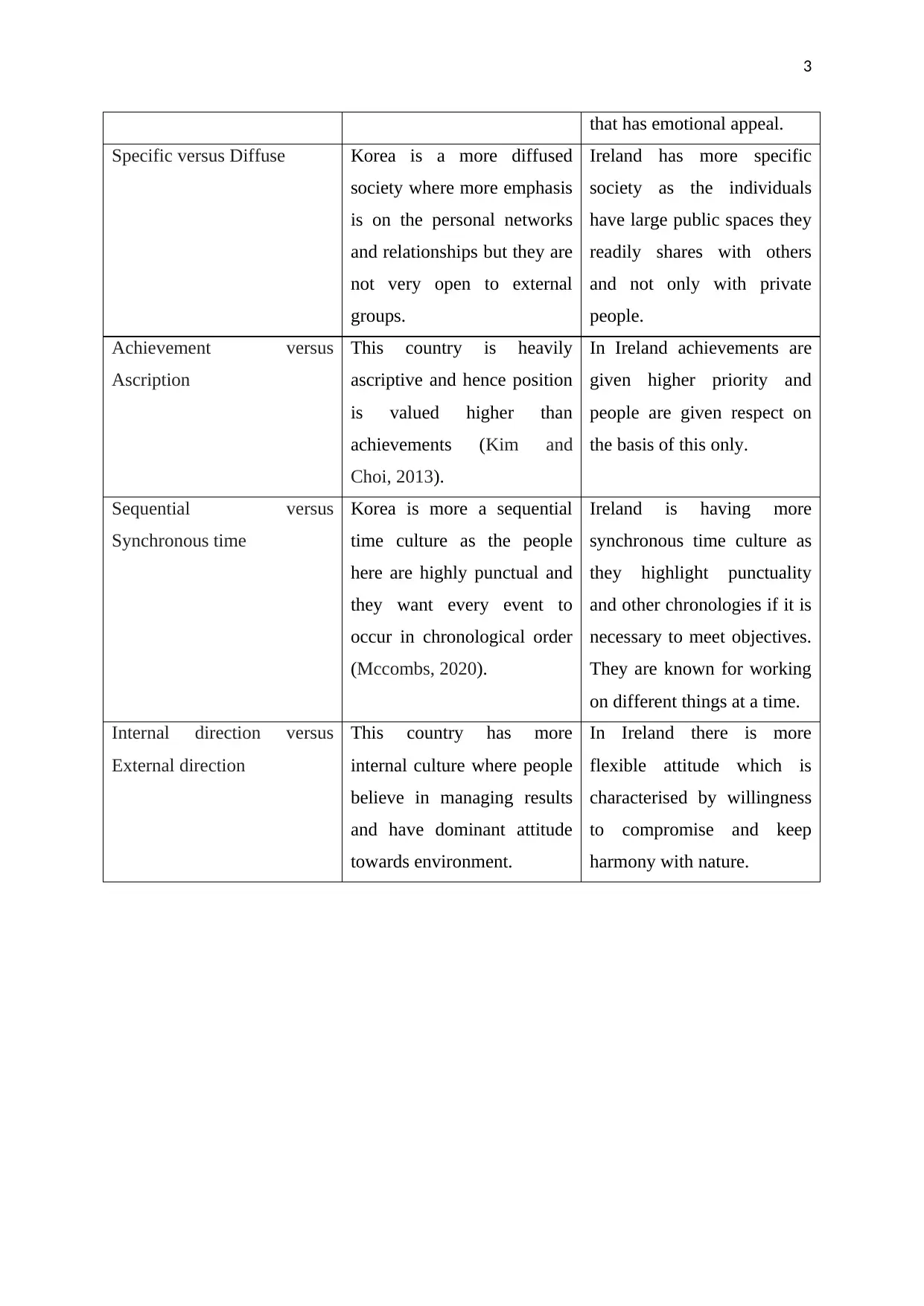
3
that has emotional appeal.
Specific versus Diffuse Korea is a more diffused
society where more emphasis
is on the personal networks
and relationships but they are
not very open to external
groups.
Ireland has more specific
society as the individuals
have large public spaces they
readily shares with others
and not only with private
people.
Achievement versus
Ascription
This country is heavily
ascriptive and hence position
is valued higher than
achievements (Kim and
Choi, 2013).
In Ireland achievements are
given higher priority and
people are given respect on
the basis of this only.
Sequential versus
Synchronous time
Korea is more a sequential
time culture as the people
here are highly punctual and
they want every event to
occur in chronological order
(Mccombs, 2020).
Ireland is having more
synchronous time culture as
they highlight punctuality
and other chronologies if it is
necessary to meet objectives.
They are known for working
on different things at a time.
Internal direction versus
External direction
This country has more
internal culture where people
believe in managing results
and have dominant attitude
towards environment.
In Ireland there is more
flexible attitude which is
characterised by willingness
to compromise and keep
harmony with nature.
that has emotional appeal.
Specific versus Diffuse Korea is a more diffused
society where more emphasis
is on the personal networks
and relationships but they are
not very open to external
groups.
Ireland has more specific
society as the individuals
have large public spaces they
readily shares with others
and not only with private
people.
Achievement versus
Ascription
This country is heavily
ascriptive and hence position
is valued higher than
achievements (Kim and
Choi, 2013).
In Ireland achievements are
given higher priority and
people are given respect on
the basis of this only.
Sequential versus
Synchronous time
Korea is more a sequential
time culture as the people
here are highly punctual and
they want every event to
occur in chronological order
(Mccombs, 2020).
Ireland is having more
synchronous time culture as
they highlight punctuality
and other chronologies if it is
necessary to meet objectives.
They are known for working
on different things at a time.
Internal direction versus
External direction
This country has more
internal culture where people
believe in managing results
and have dominant attitude
towards environment.
In Ireland there is more
flexible attitude which is
characterised by willingness
to compromise and keep
harmony with nature.
Paraphrase This Document
Need a fresh take? Get an instant paraphrase of this document with our AI Paraphraser
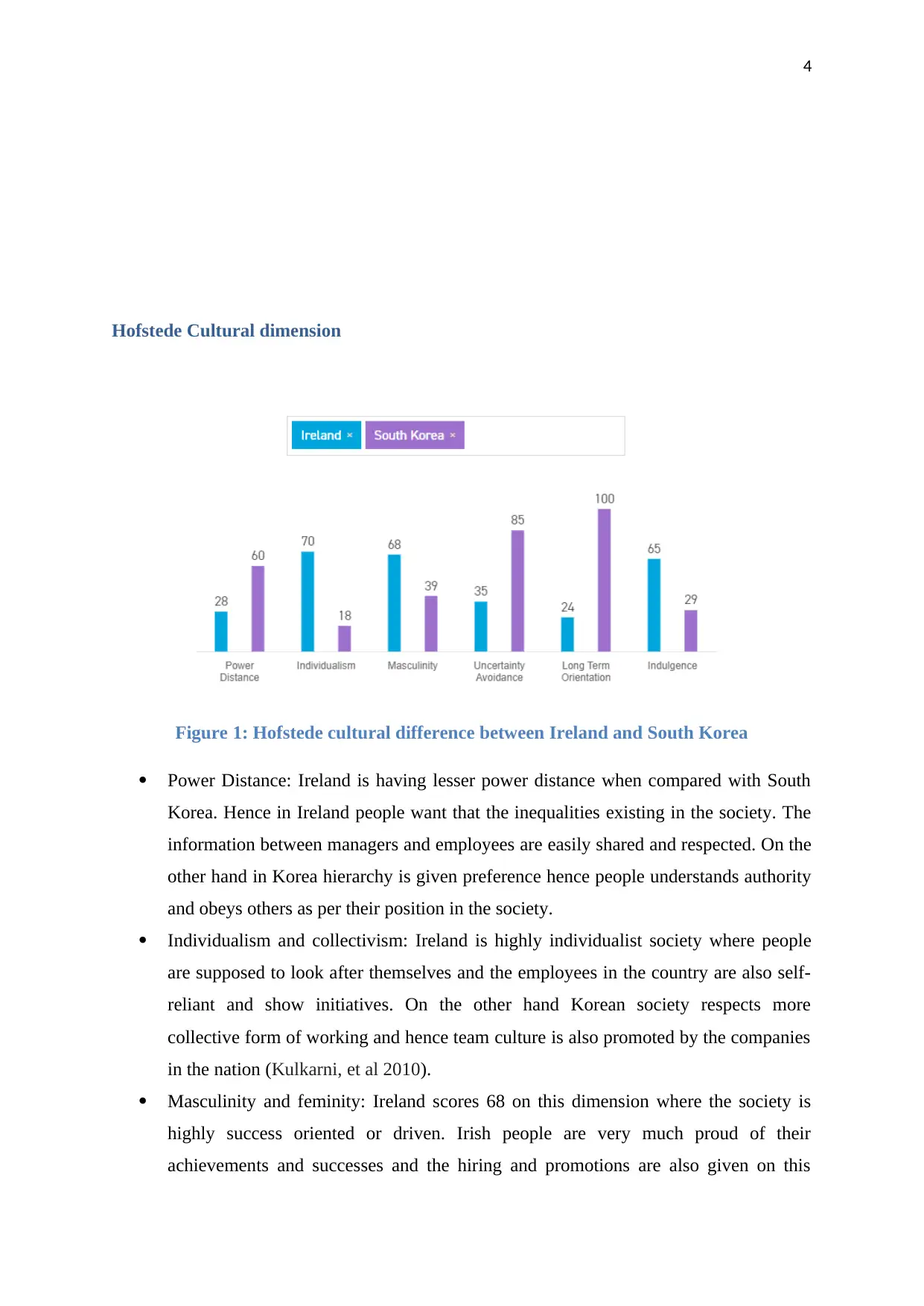
4
Hofstede Cultural dimension
Figure 1: Hofstede cultural difference between Ireland and South Korea
Power Distance: Ireland is having lesser power distance when compared with South
Korea. Hence in Ireland people want that the inequalities existing in the society. The
information between managers and employees are easily shared and respected. On the
other hand in Korea hierarchy is given preference hence people understands authority
and obeys others as per their position in the society.
Individualism and collectivism: Ireland is highly individualist society where people
are supposed to look after themselves and the employees in the country are also self-
reliant and show initiatives. On the other hand Korean society respects more
collective form of working and hence team culture is also promoted by the companies
in the nation (Kulkarni, et al 2010).
Masculinity and feminity: Ireland scores 68 on this dimension where the society is
highly success oriented or driven. Irish people are very much proud of their
achievements and successes and the hiring and promotions are also given on this
Hofstede Cultural dimension
Figure 1: Hofstede cultural difference between Ireland and South Korea
Power Distance: Ireland is having lesser power distance when compared with South
Korea. Hence in Ireland people want that the inequalities existing in the society. The
information between managers and employees are easily shared and respected. On the
other hand in Korea hierarchy is given preference hence people understands authority
and obeys others as per their position in the society.
Individualism and collectivism: Ireland is highly individualist society where people
are supposed to look after themselves and the employees in the country are also self-
reliant and show initiatives. On the other hand Korean society respects more
collective form of working and hence team culture is also promoted by the companies
in the nation (Kulkarni, et al 2010).
Masculinity and feminity: Ireland scores 68 on this dimension where the society is
highly success oriented or driven. Irish people are very much proud of their
achievements and successes and the hiring and promotions are also given on this
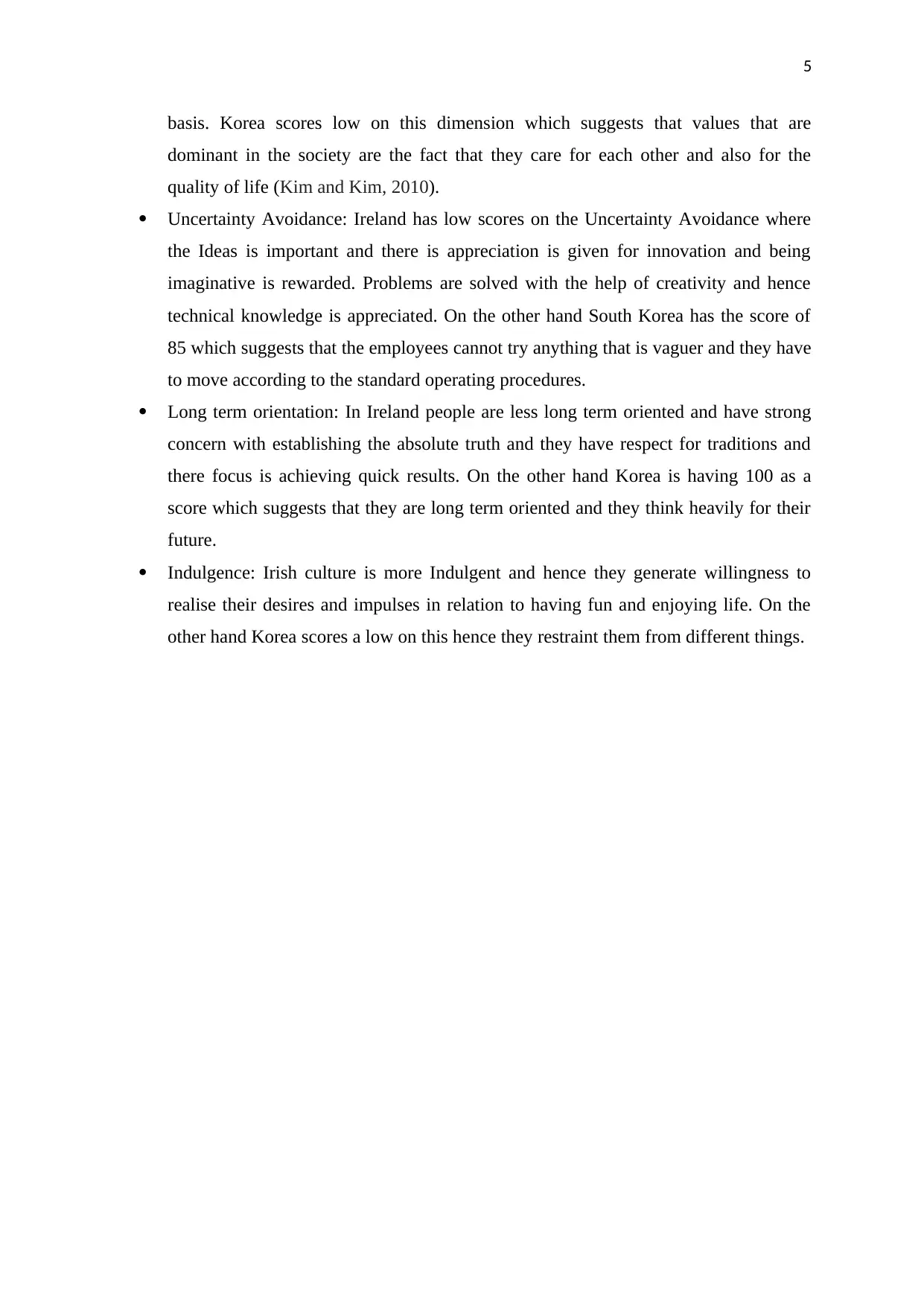
5
basis. Korea scores low on this dimension which suggests that values that are
dominant in the society are the fact that they care for each other and also for the
quality of life (Kim and Kim, 2010).
Uncertainty Avoidance: Ireland has low scores on the Uncertainty Avoidance where
the Ideas is important and there is appreciation is given for innovation and being
imaginative is rewarded. Problems are solved with the help of creativity and hence
technical knowledge is appreciated. On the other hand South Korea has the score of
85 which suggests that the employees cannot try anything that is vaguer and they have
to move according to the standard operating procedures.
Long term orientation: In Ireland people are less long term oriented and have strong
concern with establishing the absolute truth and they have respect for traditions and
there focus is achieving quick results. On the other hand Korea is having 100 as a
score which suggests that they are long term oriented and they think heavily for their
future.
Indulgence: Irish culture is more Indulgent and hence they generate willingness to
realise their desires and impulses in relation to having fun and enjoying life. On the
other hand Korea scores a low on this hence they restraint them from different things.
basis. Korea scores low on this dimension which suggests that values that are
dominant in the society are the fact that they care for each other and also for the
quality of life (Kim and Kim, 2010).
Uncertainty Avoidance: Ireland has low scores on the Uncertainty Avoidance where
the Ideas is important and there is appreciation is given for innovation and being
imaginative is rewarded. Problems are solved with the help of creativity and hence
technical knowledge is appreciated. On the other hand South Korea has the score of
85 which suggests that the employees cannot try anything that is vaguer and they have
to move according to the standard operating procedures.
Long term orientation: In Ireland people are less long term oriented and have strong
concern with establishing the absolute truth and they have respect for traditions and
there focus is achieving quick results. On the other hand Korea is having 100 as a
score which suggests that they are long term oriented and they think heavily for their
future.
Indulgence: Irish culture is more Indulgent and hence they generate willingness to
realise their desires and impulses in relation to having fun and enjoying life. On the
other hand Korea scores a low on this hence they restraint them from different things.
⊘ This is a preview!⊘
Do you want full access?
Subscribe today to unlock all pages.

Trusted by 1+ million students worldwide
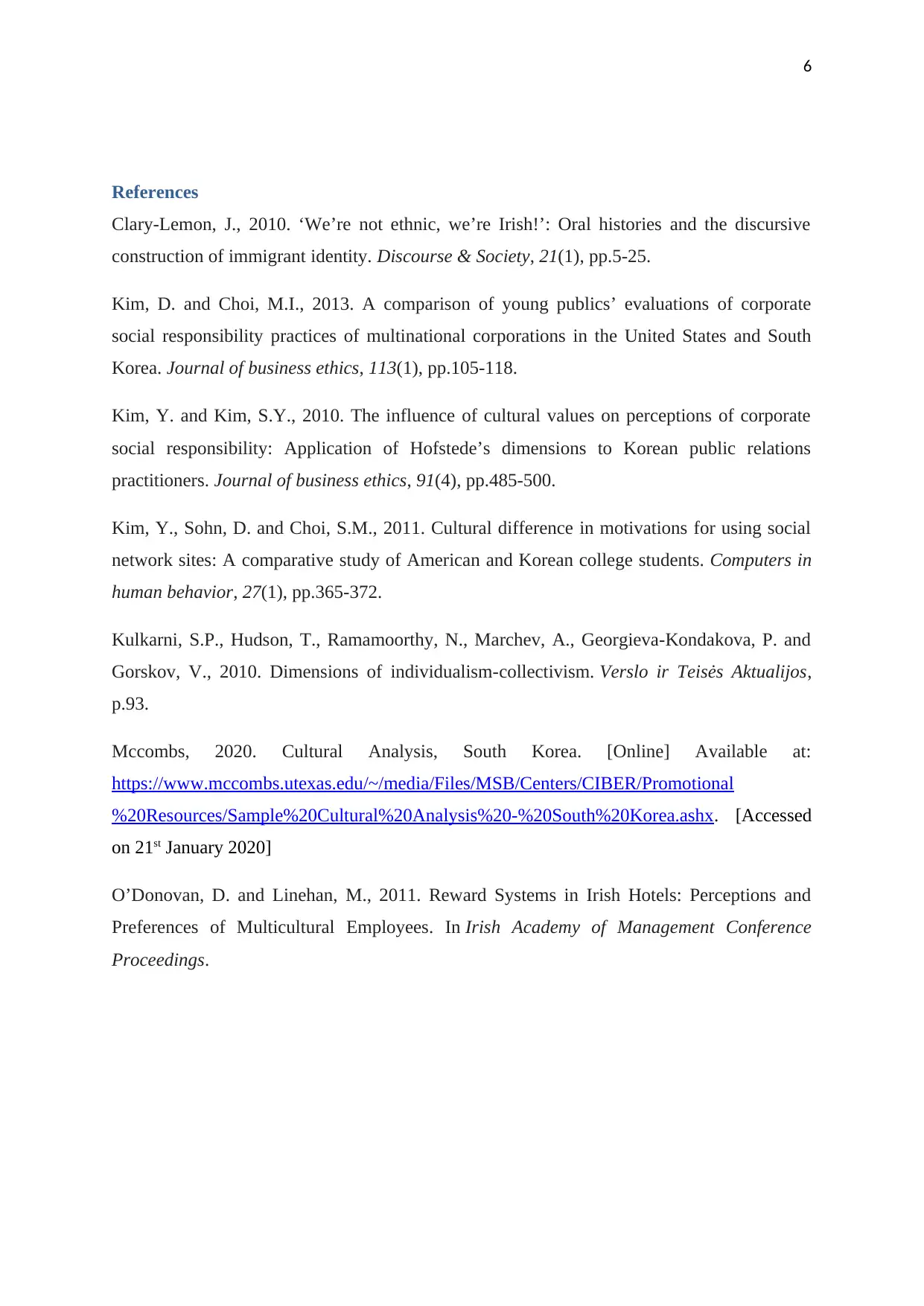
6
References
Clary-Lemon, J., 2010. ‘We’re not ethnic, we’re Irish!’: Oral histories and the discursive
construction of immigrant identity. Discourse & Society, 21(1), pp.5-25.
Kim, D. and Choi, M.I., 2013. A comparison of young publics’ evaluations of corporate
social responsibility practices of multinational corporations in the United States and South
Korea. Journal of business ethics, 113(1), pp.105-118.
Kim, Y. and Kim, S.Y., 2010. The influence of cultural values on perceptions of corporate
social responsibility: Application of Hofstede’s dimensions to Korean public relations
practitioners. Journal of business ethics, 91(4), pp.485-500.
Kim, Y., Sohn, D. and Choi, S.M., 2011. Cultural difference in motivations for using social
network sites: A comparative study of American and Korean college students. Computers in
human behavior, 27(1), pp.365-372.
Kulkarni, S.P., Hudson, T., Ramamoorthy, N., Marchev, A., Georgieva-Kondakova, P. and
Gorskov, V., 2010. Dimensions of individualism-collectivism. Verslo ir Teisės Aktualijos,
p.93.
Mccombs, 2020. Cultural Analysis, South Korea. [Online] Available at:
https://www.mccombs.utexas.edu/~/media/Files/MSB/Centers/CIBER/Promotional
%20Resources/Sample%20Cultural%20Analysis%20-%20South%20Korea.ashx. [Accessed
on 21st January 2020]
O’Donovan, D. and Linehan, M., 2011. Reward Systems in Irish Hotels: Perceptions and
Preferences of Multicultural Employees. In Irish Academy of Management Conference
Proceedings.
References
Clary-Lemon, J., 2010. ‘We’re not ethnic, we’re Irish!’: Oral histories and the discursive
construction of immigrant identity. Discourse & Society, 21(1), pp.5-25.
Kim, D. and Choi, M.I., 2013. A comparison of young publics’ evaluations of corporate
social responsibility practices of multinational corporations in the United States and South
Korea. Journal of business ethics, 113(1), pp.105-118.
Kim, Y. and Kim, S.Y., 2010. The influence of cultural values on perceptions of corporate
social responsibility: Application of Hofstede’s dimensions to Korean public relations
practitioners. Journal of business ethics, 91(4), pp.485-500.
Kim, Y., Sohn, D. and Choi, S.M., 2011. Cultural difference in motivations for using social
network sites: A comparative study of American and Korean college students. Computers in
human behavior, 27(1), pp.365-372.
Kulkarni, S.P., Hudson, T., Ramamoorthy, N., Marchev, A., Georgieva-Kondakova, P. and
Gorskov, V., 2010. Dimensions of individualism-collectivism. Verslo ir Teisės Aktualijos,
p.93.
Mccombs, 2020. Cultural Analysis, South Korea. [Online] Available at:
https://www.mccombs.utexas.edu/~/media/Files/MSB/Centers/CIBER/Promotional
%20Resources/Sample%20Cultural%20Analysis%20-%20South%20Korea.ashx. [Accessed
on 21st January 2020]
O’Donovan, D. and Linehan, M., 2011. Reward Systems in Irish Hotels: Perceptions and
Preferences of Multicultural Employees. In Irish Academy of Management Conference
Proceedings.
1 out of 7
Related Documents
Your All-in-One AI-Powered Toolkit for Academic Success.
+13062052269
info@desklib.com
Available 24*7 on WhatsApp / Email
![[object Object]](/_next/static/media/star-bottom.7253800d.svg)
Unlock your academic potential
Copyright © 2020–2026 A2Z Services. All Rights Reserved. Developed and managed by ZUCOL.




